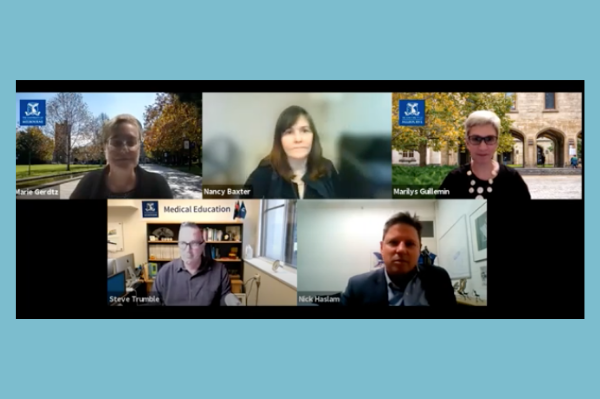Industry insights: the future of the health sector in Australia
Hear from industry experts as they discuss the future of healthcare careers and innovations in teaching and learning.

On the panel
Host: Professor Marilys Guillemin, Associate Dean, Learning and Teaching, Faculty of Medicine, Dentistry and Health Sciences
Professor Nancy Baxter, Head, School of Population and Global Health
Professor Marie Gerdtz, Head, Department of Nursing
Professor Nick Haslam, Professor, Melbourne School of Psychological Sciences
Professor Steve Trumble, Head of Department, Medical Education
The COVID-19 pandemic has placed an enormous strain on the health sector and illuminated the extraordinary work of healthcare professionals globally. The healthcare system is quickly adapting to a changing landscape, so what does this mean for the future of the health sector in Australia?
The Future of Healthcare in Australia webinar brings together five industry experts to explore the changes, challenges, and opportunities that COVID-19 has created for the health industry. The session will help prospective students understand what the future holds and will be relevant for those looking to enter the sector, or to up-skill in their careers.
The panel addresses key questions about the future of health care in Australia.
How has the pandemic changed the future of health in Australia?
The pandemic represents a turning point for the way society sees and values the sector. Professor Steve Trumble, Head of Medical Education at the Melbourne Medical School, says science is now driving strategy for the nation as we cope with and come out of pandemic. “It’s resulted in an extraordinary revisioning of what health and health care is all about,” he said.
Professor Nancy Baxter, Head of the Melbourne School of Population and Global Health says that usually we hardly ever think about public health, because it’s about prevention. But the pandemic has highlighted areas of neglect. Professor Baxter says increased appreciation for the importance of public health, will translate to investment into the parts of our system that the pandemic has shown were inadequate.
As Professor Nick Haslam from the Melbourne School of Psychological Sciences says, the pandemic has also taught us the importance of new modes of delivery like telehealth, especially since even pre-COVID, the demand for mental health care far exceeded supply. “There's been roughly 30% increase in referrals to psychologists and other mental health professionals and it's now extremely hard to get timely care,” he said. Professor Haslam says that one of the most critical lessons is that we need better responsiveness to important issues such family violence and suicide prevention.
How will integration between disciplines and interprofessional learning help us post-pandemic?
The pandemic has highlighted the vital role of nurses in delivering public health messages. “This is a timely reminder that nurses need to up skill, especially in areas of public health,” explains Professor Marie Gerdtz, Head of the Department of Nursing. New models of care are evolving all the time so there is an opportunity for nurses to step-up and take on advanced practice roles. “We are really excited to work closely with our colleagues across the Faculty so that interprofessional learning drives the curriculum,” said Professor Gerdtz. This integration has benefits for clinical practice and recognises the fundamental role of nurses in the health system.
What are the impacts of COVID-19 on the health workforce and future demand?
Professor Baxter is confident that the increased appreciation for what public health does, will translate to investment in the parts of our system that the pandemic has shown were inadequate. “One of the great things about public health as a discipline is that you can enter into the workforce from an undergraduate degree, or you can use it to change or enhance your career. The Master of Public Health or the Graduate Certificate can be valuable for those already in a health discipline, to gain expertise in a new area,” she said.
For those wanting to enter the medical profession, there will be a demand for generalist skills and this required an openness to a variety of career paths rather than specialisation, according to Professor Trumble. This is particularly in rural areas of Australia where there remains a massive shortage of doctors. There are acute shortages in critical care, mental health and aged care for nursing in Australia according to Professor Gerdtz. Similarly, we need more psychologists from a range of backgrounds and importantly we need better distribution across socio-economic divides explained Professor Haslam.
To hear more insights on the future of healthcare in Australia watch the full panel discussion here.